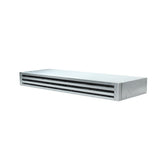Are you anxious to season your cast iron pan? Try it out with coconut oil!
This process only takes about an hour in the oven and you’ll have a tough seasoning that’ll last for years to come.
Keep in mind that coconut oil is mostly saturated fat. Saturated fats do not polymerize as readily as unsaturated fats. You might consider using grapeseed oil instead, which is made up of mostly unsaturated fats.
But if you have coconut oil lying around, it’ll work just fine. Here’s our quick oven method on how to season cast iron with coconut oil.
Note: If your pan has a wooden handle, you’ll need to season your cast iron on the stovetop.
What You Need
- ~1 tbsp coconut oil (depending on the size of the pan)
- Abrasive scrubber - sponge or scrub brush
- Dish towel
- Dish soap
- Oven
- Sink
- Baking sheet or aluminum foil
1. Preheat your oven to 325º F. (extra virgin coconut oil) or 350º F. (refined coconut oil).
It’s important to keep the oven temperature below the smoke point of your coconut oil. Extra virgin coconut oil has a smoke point of 350º F. while refined cooking oil has a smoke point of 450º F. Double check which type you have before you preheat your oven.
A little smoking is fine – in fact, this tells you the seasoning is working. But prolonged excessive heat will cause your coconut oil to burn.
If that happens, you’ll want to reseason the pan. When oil burns off, it becomes bitter and will impart that flavor into the pan.
2. Add a layer of foil or a baking sheet under the pan to catch drips.
3. Clean your pan thoroughly with an abrasive scrubber and dish soap.
When your cast iron pan arrives from the factory, it often has a factory coating that needs to be removed before seasoning. Scrub the pan with a scrubby sponge or steel wool and dish soap to completely remove this coating.
After you season your cast iron cookware, we don’t recommend using abrasive scrubbers to clean cast iron. But in this case, you are preparing the pan for seasoning, So scrub away!
4. Dry the pan thoroughly with a towel, then on your stovetop.
Before seasoning, you want to remove all moisture from the pan. After drying it with a towel, heat the pan up for a couple of minutes to remove the last remaining water from it.
5. Apply a thin layer of coconut oil to the entire pan: bottom, handle, sides, and interior.
Add some coconut oil into your cast iron pan and spread it with a paper towel. You don’t need to be too generous with the coating. Just make sure you cover the entire pan.
6. Bake your cast iron pan upside down in the oven for one hour.
You don’t want the coconut oil to pool in the bottom of your pan while it’s baking. Otherwise, it will come out sticky. So make sure it’s upside down!
7. Let it cool in the oven for at least 30 minutes.
8. Start cooking!
Seasoning your pan with coconut oil is that simple! Remember to reseason it twice a year. If you cook often with acidic food or do a lot of high heat cooking, you may need to season your pan more often.
You can repeat steps five to seven a few times to toughen up the layer of seasoning on your pan if you’d like. But it’s not required.
Is coconut oil healthy for cooking?
Compared to other plant-based oils like olive oil and canola oil, coconut oil is much higher in saturated fats. This raises cholesterol levels and can lead to poor heart health.
Is coconut oil good for deep frying?
Yes, coconut oil is high in saturated fats which means it is quite stable at high temperatures. Experts are divided on the detrimental impact of saturated fats. The American Lung Association recommends that saturated fats make up only about 5% of your daily caloric intake.
How long does coconut oil last?
Virgin or extra virgin coconut oil lasts three to five years once opened. Refined coconut oil lasts about one to two years. Due to its high saturated fat content, coconut oil does not go rancid as quickly as other plant-based oils.
Can you store coconut oil in the fridge?
Yes, but it’s not necessary. If you store coconut oil in the fridge, it will harden and become difficult to scoop from the jar. If that happens, you can heat it in warm water on the stove or leave it out of the fridge for a while.
Is it OK to use liquefied coconut oil?
Yes, it’s natural for coconut oil to liquefy and solidify in response to temperature changes. Coconut oil starts to melt at about 75º. But this does not impact the quality of the oil.
Thanks for reading our post on how to season cast iron with coconut oil. Hopefully it worked well for you. If not, remember that you can repeat the process a few times to strengthen the layer of seasoning.
Related Articles
How to Season Cast Iron with Avocado Oil
How to Season Cast Iron with Olive Oil
How to Season Cast Iron with Canola Oil













